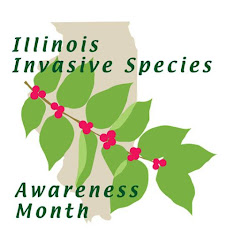Article published at
http://www.dailyherald.com/article/20120526/news/705269820/
By Mitchell Armentrout
Illinois boaters will soon need to think twice before launching at area lakes.
New legislation targets the spread of invasive plant species by penalizing owners with weeds attached to their boats, the so-called “aquatic hitchhikers” that have put a major strain on lake ecosystems across northern Illinois.
The bill, introduced last November by State Rep. JoAnn Osmond of Gurnee, passed both houses in Springfield on May 15. Gov. Pat Quinn is expected to sign it into law by mid-June.
Under the proposed regulations, police officers could stop people with plant life attached to their boats and other watercraft, issuing a warning or fine of up to $75.
“It’s not about collecting fines — we’re trying to be friendly and educate with these regulations,” Osmond said.
Environmental officials have been dealing with invasive plant species, such as Eurasian water milfoil and curly pondweed, for decades. The alien species crowd out native populations and upset the balance of lake ecologies.
They also make it harder for people to swim and fish, lowering property values and leading to losses for the extensive recreational economy in northern Illinois.
With more than 75 lakes, Lake County has the highest concentration of any county in the state. Michael Adam, senior biologist at the Lake County Health Department, said the bill addresses a growing problem with the invasive plants plaguing regional lakes.
“I can’t think of a community that isn’t affected,” Adam said. “In the vast majority of our lakes, it’s a matter of containing these harmful plants.”
Owners who don’t clean their boats are largely to blame, according to Cathy McGlynn of the Northeast Illinois Invasive Plant Partnership.
“The main method of transport is on the outside of our boats, as people hop from one lake to the next,” McGlynn said.
Ed Lochmayer, co-chairman of the Bangs Lake Advisory Committee in Wauconda, said they manage the invasive populations with a harvesting boat used to cut down the weeds four days per week. He said the village had considered going ahead with its own ordinances to curb aquatic hitchhikers.
“We wanted to see what direction the state would go, but for a while we considered taking the issue on our own,” Lochmayer said.
More recently, the looming threat of several new, more aggressive aquatic plants that have struck the Midwest has lake officials concerned. A strain of Brazilian elodea, a rapid-spread waterweed that originated as an aquarium plant, showed up last year in Libertyville.
Another new threat, hydrilla, cost tens of millions of dollars to contain in an Indiana outbreak last year.
The only way to treat the invasive species are through physically cutting the plants, using expensive herbicides or bringing in aquatic weevils that feed on the plants, an approach that has yielded mixed results.
“With most of these species, it’s a matter of when, not if, they’re going to appear,” McGlynn said. “Our best bet is prevention and early detection.”
Mike Clifton, president of the Loon Lakes Management Association in Antioch, tried that proactive angle last year after hydrilla showed up in southern Wisconsin. He approached Osmond about sponsoring legislation similar to regulations in place elsewhere in the Midwest.
“We had it knocking right on our door, and she was really willing to help us out,” Clifton said.
If the law is signed, new signage made by the Illinois Department of Natural Resources will be posted at marinas and boat launches across the state.
Illinois joins Minnesota, Wisconsin, Indiana and Kentucky as Midwest states with regulations against aquatic life transport.
Experts said the main benefit of the new legislation is the attention it shines on the issue.
“It’s a step in the right direction,” Adam said.
But ultimately, they say, the health of lake ecosystems across Illinois depends on the action of residents.
“It’s going to come down to public participation,” McGlynn said. “We need people to make the effort and be conscientious of the impact they can have on the environment.”

